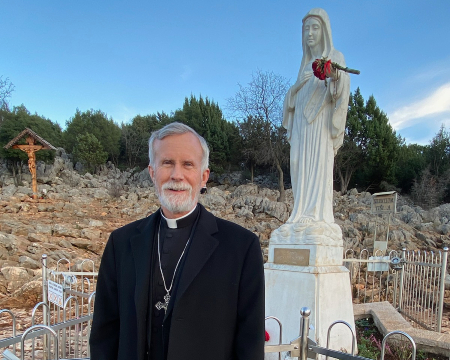SATURDAY HOMILY: New Wine and New Wineskins Needed
FREE Catholic Classes
How should we understand Jesus' reference to wineskins? We are used to buying and storing wine in bottles. In the time of Christ, this was possible, but impractical. Glass was a precious material and was usually produced in small quantities. Bottles could not be transported easily, and being a costly material, would have required too much care for the average home. Through spiritual blindness, the "wineskins" of the Old Covenant had been rendered incapable of receiving the Good News of salvation. A total transformation was necessary.
We ask you, humbly: don't scroll away.
Hi readers, it seems you use Catholic Online a lot; that's great! It's a little awkward to ask, but we need your help. If you have already donated, we sincerely thank you. We're not salespeople, but we depend on donations averaging $14.76 and fewer than 1% of readers give. If you donate just $5.00, the price of your coffee, Catholic Online School could keep thriving. Thank you.Help Now >
Highlights
Catholic Online (https://www.catholic.org)
7/6/2013 (1 decade ago)
Published in Year of Faith
Keywords: Gospel of Mark, Old Wineskins, New Wineskins, Pharisees, Year of Faith, Daily Homily, St. Theresa Sugar Land, Fr. Stephen B. Reynolds
SUGAR LAND, TX (Catholic Online) - Today's Gospel (Matt. 9:14-17) finds the Lord in a series of disputes with the Pharisees. These men were part of a movement of spiritual renewal among the Jews at the time of Christ. The Pharisees were very concerned about the national identity of Israel, rooted in the covenant between God and the Chosen People. The Torah (or Law), contained in the first five books of the Old Testament, gave concrete instructions on how to live the Covenant faithfully.
An essential part the Pharisees' program was the radical separation of the faithful Jew from the political and cultural forces of the time. Ritual purity and wholehearted compliance with the dictates of the Torah were essential to affect and maintain this separation in light of the defilement of the Roman Empire and Greek culture. Given this worldview, we can understand why the Pharisees placed such a strong emphasis on strict observance of the Law.
Carried to an extreme, the practice of the Pharisees robbed the Law - the Word of God, after all - of its dynamism and life-giving power. "Blind guides," Jesus calls them (see Matthew 15:14; 23:16, 24). The Pharisees' attitude compromised their capacity to grasp Jesus' teaching on the liberating power of the Law: "Think not that I have come to abolish the law and the prophets; I have come not to abolish them but to fulfill them" (Matthew 5:17).
St. Matthew illustrates the principle, "No one patches an old cloak with a piece of unshrunken cloth, for its fullness pulls away from the cloak and the tear gets worse. People do not put new wine into old wineskins. Otherwise the skins burst, the wine spills out, and the skins are ruined. Rather, they pour new wine into fresh wineskins, and both are preserved." (Mt. 9:16, 17). This comment merits some reflection.
Jesus often uses concrete and dynamic images to illustrate his point. Speaking in parables, for example, was a method of making a teaching memorable and easily understandable. Likewise, by drawing from examples of everyday life, Jesus is helping his hearers to connect the Gospel with their ordinary experience.
How should we understand Jesus' reference to wineskins? We are used to buying and storing wine in bottles. In the time of Christ, this was possible, but impractical. Glass was a precious material and was usually produced in small quantities. Bottles could not be transported easily, and being a costly material, would have required too much care for the average home.
At the time of Christ, liquids would be stored in clay jars or in containers made of animal skin. The latter were particularly convenient for transportation, as they could be carried easily, were lightweight, and would occupy less and less space as the liquid was consumed. Wineskins required a modicum of care, given that after a period of use, the leather would become worn and could easily rupture, especially if filled with unfermented ("new") wine.
Jesus uses this image to teach us about the new covenant that he inaugurates. Through spiritual blindness, the "wineskins" of the Old Covenant had been rendered incapable of receiving the Good News of salvation. A total transformation was necessary. Jesus transmits his New Covenant of grace through the mediation of the Church, the new wineskin.
"The Church is both the means and the goal of God's plan: prefigured in creation, prepared for in the Old Covenant, founded by the words and actions of Jesus Christ, fulfilled by his redeeming cross and his Resurrection" (Catechism of the Catholic Church, no. 778).
Without proper care, our souls, too, can become like old, thin wineskins, weakened by sin and spiritual sloth. Maintaining the suppleness of our souls - their capacity to hear, receive, and act upon the Word of God - requires vigilance and care. But the Lord is always at hand, offering us his grace through the sacraments to repair what is broken, strengthen what is weak, and fortify what is healthy.
__________
Fr. Stephen B. Reynolds is pastor of St. Theresa Catholic Church in Sugar Land, TX, a suburb of Houston. You may visit the parish website at: www.SugarLandCatholic.com.
---
'Help Give every Student and Teacher FREE resources for a world-class Moral Catholic Education'
Copyright 2021 - Distributed by Catholic Online








 Daily Readings for Saturday, April 20, 2024
Daily Readings for Saturday, April 20, 2024 St. Marian: Saint of the Day for Saturday, April 20, 2024
St. Marian: Saint of the Day for Saturday, April 20, 2024 Children's Prayer For Parents: Prayer of the Day for Saturday, April 20, 2024
Children's Prayer For Parents: Prayer of the Day for Saturday, April 20, 2024

